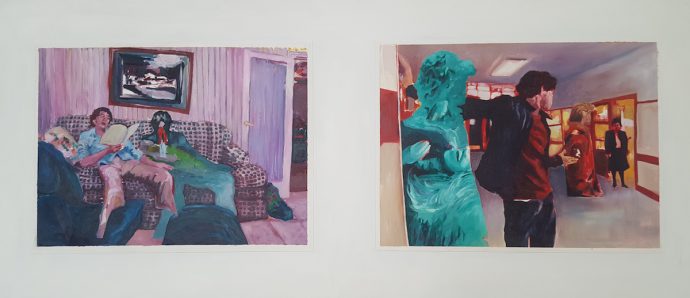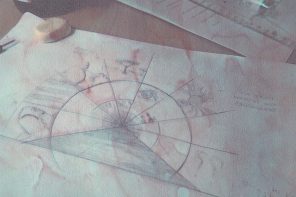We are built in the vertical dimension of a dream, freaks of nature who hover above the plain white of the pages that seem to bind everyone else. We glow around our edges, I think, or we are super-saturated, I don’t know. I can’t see what they see, but I’m certain that there must be some sign that others us, that draws us as complicated metaphors or causes people to perceive immediately that we are different, that our presence is different, that we are double-exposed. The thing they see twins us. The thing they see pushes our names into one sentence, into a single frame. When we exist in the same space what we are is less you and less I, we become instead a dotted line, a bridge of connective tissue, an eye-line edit that subconsciously links me to you or you to me or melds us into some fluid combination, some hybrid being. They whisper about it like it’s a secret, like we are fascinating to them for reasons I have yet to learn but would like to find out, like we are being studied in every dimly lit bar or overcrowded living room. Like we are being studied in this kitchen, the beat of some grimy nostalgia trip pulsing from the other room, making them all speak louder. They are laughing, sharp cackles and drunk exclamations and all the while we are being watched from the corners of their eyes. You feel it too. You know. You know it’s like you are whispering, always, some running commentary into my ear or that I am doing that to you, that this is happening though we stand on opposite ends of a spectrum, of a stage. Or maybe what we whisper is the incantation that keeps us bound before them, words that thread together loose fictions, suggestions draped from helix to helix or which pierce the flesh of our necks and arms, the lean layers of musculature at our ribs, which wrap around us and twist our arms back with invisible ropes. It’s this though they barely know me and this though I could say the same about my relationship to you.
Or maybe what we whisper is the incantation that keeps us bound before them, words that thread together loose fictions. . .
When we are introduced more officially you know why I ask the things that I do. You know who I am and why we are speaking. You are not surprised when I ask if it bothers you that I need to look at your eyes for so long, nor when I assure you that I am searching for something, for a thing that is not just you and is not of you. I am not flirting with you. And perhaps it is true when you say that you do not question this, that you know my interest in you extends only as far as your interest in me or my interest in myself, that the conversation we have is one of necessity. I can’t imagine that you don’t second guess my claim when I ask you to show me your fangs, when I put my fingers in your mouth to run them along the edges of your teeth, when I ask you questions about where you came from, what your anxieties are, if you exist by yourself, if you made yourself. The answers: North. A house on a cul-de-sac street. Rows of small holes and perforations. Dying before your father. Dying accidentally. Dying at the hands of another. Boring things. Split-second aneurysms, vomiting blood, uprising, creeping madness, God existing, God not existing, the ever-present certainty that you are a fraud. And yes, you seem self-made but no, you don’t know what that means because, in some ways, you tell me, you are afraid of yourself.
In this kitchen, there is still the party. There is still an audience and there are still half empty bowls of chips and there is still a housefly someone let in when they stepped out to smoke, but maybe there is none of this. Maybe it is as we see it, that our host has disappeared and with her the others, the empties, the plastic cups, the melted ice. Maybe it is as we see it the moment I touch the serrated edges of your teeth, when you ask me to try to hurt you, when I carefully dislocate your joints, gently, one after the next until you stand crooked and strange before me and I feel guilty. There is still the party, I think, though if there is they don’t see me correct this trauma, they don’t see me show you a birthmark like a bruise just below my breast and they don’t see you when you show me that yours is there too, raised where mine is flattened, its edges precise where mine seem blurred. There’s a way that you wince when you touch it, and it’s a way that makes me use recycled words to describe our situation. Orbit is the one I like best. The one where I get to be a collapsing star, where I color myself with neutrons and gamma-rays, white dwarfs and supermassive black holes. “This is proof of something,” you say, though in reference to what I don’t know, though I tell you we will have to perform tests, we would have to cut into the marks and pull out our fangs and you would need to study the ridges of my spine in a manner more precise than simply looking. There is something we are missing, and it is not the party, and it is not these things we have that seem to bind us, and it is not found when you take my hand in yours and it is not found when you stare back into my eyes and it is not found when you inch closer and it is not found in some gravitational pull and it is not found when we move to another room and it is not found when I touch you, when I reach under your ribcage and search blindly for your heart and it is not found when your fingers find mine first or when you close your fist or when our muscles contract and it is not found it is not found it is not found
Jessica Berger is a fiction writer, an editor with Grimoire Magazine, and occasional critic whose work has appeared in Pank, The &NOW Awards: The Best Innovative Writing, Trnsfr, Midwestern Gothic, Metazen, Suburban Diaspora, and elsewhere.



